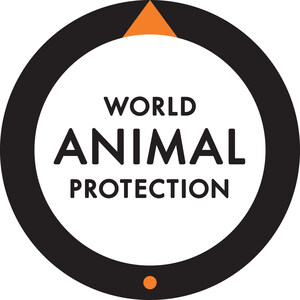NEW YORK, Oct. 29, 2024 /PRNewswire/ -- Jakarta Animal Aid Network (JAAN), with the support of World Animal Protection, has rescued a troupe of 31 macaque monkeys from Indonesia's last remaining 'monkey dance training village'.
The monkeys have been transferred from their handlers in Cirebon and relocated to the JAAN rehabilitation center in Cikole, West Java. Their rehabilitation program will focus on nursing them back to health, both mentally and physically, and if possible, preparing for them to return to the wild again.
These long-tailed macaques were taken from the wild - from as young as eight months old - to be cruelly trained for months on end, with the aim to dance and collect money from shoppers and tourists on the street.
The typical 'dancing monkey' training regime involves starving, beating, and chaining monkeys by their necks, and forcing them into masks and doll outfits. The monkeys are made to stand for hours on two legs, or risk being choked. When they aren't dancing, they are often kept in tiny single cages for prolonged periods.
Dr. Jan Schmidt-Burbach, Head of Animal Welfare and Research at World Animal Protection, said:
"These monkeys have endured one of the cruelest training regimes imaginable. After being stolen from their mothers as babies and tortured for months, their living nightmare is finally over. We helped end bear dancing in Greece, Turkey, India, and Nepal, and now we are one step closer to ending these horrific dancing monkey practices in Indonesia for good. We look forward to the day when we can celebrate a nationwide ban on dancing monkeys. Macaques are wild animals who have the right to live a wild life. We're happy that together with our partners at Jakarta Animal Aid Network (JAAN) we can give these monkeys a second chance."
Femke den Haas, CEO at Jakarta Animal Aid Network said: "These are Jono and Monon, both male long tail macaques who have endured a life of suffering since they were little infants. They were terribly abused while being trained as a 'dancing monkey' and during the entertainment of tourists. "It is such an incredible relief to see the dark boxes, in which the monkeys were kept when they were not performing, finally get opened. It is really heartwarming, knowing that their journey to freedom has started in which they will be able to connect to each other and to other primates and live a life they truly deserve."
Now these 31 monkeys have been rescued, each of them is quarantined for approximately two to three months to reduce the risk of disease transmission. During this period, they will undergo a series of veterinary examinations, including x-ray tests to detect whether they have any gunshot wounds. This is because macaques are shot when poached from the wild, often with air rifles that use small bullets that wound instead of kill.
The rescued monkeys will explore new diets and environments, as well as develop climbing, foraging, and predator avoidance skills. JAAN also does extensive work to create new family social bonds between the rescued monkeys so they can hopefully be released together as a family, and therefore able to socialize like they would in the wild.
In addition to these 22 monkeys, nine remaining macaques are planned to be rescued and relocated in the coming week. After this, the training center in Cirebon will be monkey-free and close its doors forever.
The practice of dancing monkeys for entertainment is known as Topeng Monyet in Indonesia, which literally translates to "monkey mask". In 2019, the Indonesian Ministry of Forestry and Environment instructed a ban on the use of dancing monkeys, however this has not been implemented. So, while Cirebon is the final dancing village, more needs to be done to completely eradicate the practice in Indonesia.
World Animal Protection is working with JAAN to ensure this is the last generation of dancing monkeys. The Indonesian Government and JAAN are supporting the handlers to establish them with alternate livelihoods that don't involve harming animals. Each handler has outlined their desired pathway, which most commonly involves selling toys, accessories, and food.
Long-tailed macaques are one of the most traded and exploited primates in Indonesia. Due to their remarkable intelligence and social skills, this species has sadly become a target of the entertainment, pet, and research industries. Years of exploitation have led to this species becoming endangered.
World Animal Protection's Bred for Profit research indicated that around 5.5 billion animals are kept in wildlife farms across the world, often in appalling conditions, for entertainment or tourist attractions, for petting, or to be turned into ornaments, luxury food, fashion products, or traditional medicine. The animal welfare organization is working to bring an end to these practices.
In September, World Animal Protection US launched a fundraising campaign to support this rescue mission. The funds raised will be used to provide food and veterinary care for the monkeys as they undergo their rehabilitation. To support this cause, click here.
About World Animal Protection
World Animal Protection is a global organization working to end animal exploitation. We expose cruel systems, promote animal-friendly alternatives, and influence policy change. For over 70 years, we've been rewriting the story for animals.
Working across almost 50 countries with offices in 12, we are the only global Animal Welfare Organization with general consultative status with the UN Economic and Social Council (ECOSOC) and all its subsidiary bodies It enables us to engage with and influence global decision-makers. We prioritize animals in farming and wild animals exploited for use in entertainment, as pets, and in fashion.
SOURCE World Animal Protection

WANT YOUR COMPANY'S NEWS FEATURED ON PRNEWSWIRE.COM?
Newsrooms &
Influencers
Digital Media
Outlets
Journalists
Opted In





Share this article